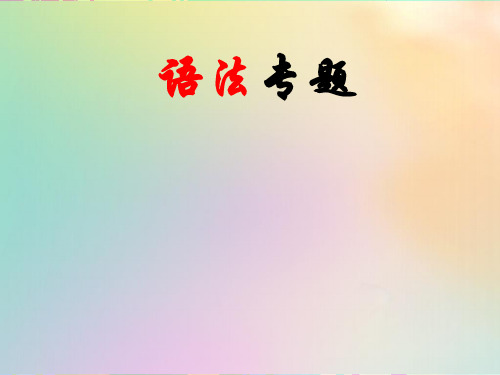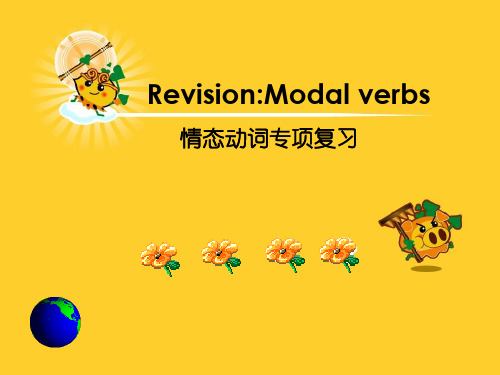专题十一 情态动词(试题部分).ppt
合集下载
情态动词(20张PPT)初中英语专项复习课件

看法。
(1)只作情态动词:must;can/could;may/might;ought to
(2)既可作情态动词又可作实义动词:need,dare
((34))既 具可 有作 情情 态态 动动词词某又些可特作征稿稿定助:定hPa动PPvTP,e词T/海h:量asd素ha材tlo持l;/s续hha更odublde;twteirll/would
【知识拓展】
1. must的一般疑问句,肯定回答为Yes, ...must.;否定回答为No, ...needn’t./No, ...don’t have
to.—Must I clean the classroom now? 我必须现在打扫教室吗?
—Yes, you must. 是的,你必须。/No, you don’t have to. /No, you needn’t. 不,你不必。
He promised he would never smoke again. 他承诺他再也不吸烟了。
Their English teacher would tell them stories in
表示过去反复发生的动 English after class.
作或某种倾向
他们的英语老师总是在课后用英语给他们讲故事
新,上千款模板选择总有一
款适合你
知识点二:情态动词的特点
情态动词的特点: (1)情态动词无人称和数的变化(have to除外); (2)情态动词后接动词原形; (3)情态动词的否定式是在其后加not; have to除外 (4)具有助动词的作用,可用来构成否定句、疑问句及用于简明答语; (5)个别情态动词有现在式和稿过定去PP式T两种形式,过去式用来表达更加客气、委 婉的语气,时态性不强,可稿用定于PPT过,海去量、素材现持在续更或将来。
(1)只作情态动词:must;can/could;may/might;ought to
(2)既可作情态动词又可作实义动词:need,dare
((34))既 具可 有作 情情 态态 动动词词某又些可特作征稿稿定助:定hPa动PPvTP,e词T/海h:量asd素ha材tlo持l;/s续hha更odublde;twteirll/would
【知识拓展】
1. must的一般疑问句,肯定回答为Yes, ...must.;否定回答为No, ...needn’t./No, ...don’t have
to.—Must I clean the classroom now? 我必须现在打扫教室吗?
—Yes, you must. 是的,你必须。/No, you don’t have to. /No, you needn’t. 不,你不必。
He promised he would never smoke again. 他承诺他再也不吸烟了。
Their English teacher would tell them stories in
表示过去反复发生的动 English after class.
作或某种倾向
他们的英语老师总是在课后用英语给他们讲故事
新,上千款模板选择总有一
款适合你
知识点二:情态动词的特点
情态动词的特点: (1)情态动词无人称和数的变化(have to除外); (2)情态动词后接动词原形; (3)情态动词的否定式是在其后加not; have to除外 (4)具有助动词的作用,可用来构成否定句、疑问句及用于简明答语; (5)个别情态动词有现在式和稿过定去PP式T两种形式,过去式用来表达更加客气、委 婉的语气,时态性不强,可稿用定于PPT过,海去量、素材现持在续更或将来。
【高中语法复习】情态动词(共48张PPT)

need to do
need do
Need 的回答
Need I come here tomorrow ? Yes, you must.
No, you needn’t. / you don’t have to.
Johnny, you ____ play with the knife, or you ____ hurt yourself.
猜测
--Oh my god ! Can it be true ? --It can’t be ture.
常用词组积累 can not/ never…too; can’t…enough
can’t help doing
无论怎么…都不过分 禁不住;不由得
I could have worked out the question, but I was too nervous.(过去有能力做但未做)
I must take care of my hairstyle.
must 的回答
-不用mustn’t回答-
Must I go to school today?
Yes,you must !
No, you don’t have to. /needn’t. /had better not.
You mustn’t bully your brother. He must have seen the answer.
时态 单复数 肯定变否定
提问
3
情感和态度
can
could may
might must should
情态动词 情态实意
must, can, could, may, might, ought stohall, should, will, would
need do
Need 的回答
Need I come here tomorrow ? Yes, you must.
No, you needn’t. / you don’t have to.
Johnny, you ____ play with the knife, or you ____ hurt yourself.
猜测
--Oh my god ! Can it be true ? --It can’t be ture.
常用词组积累 can not/ never…too; can’t…enough
can’t help doing
无论怎么…都不过分 禁不住;不由得
I could have worked out the question, but I was too nervous.(过去有能力做但未做)
I must take care of my hairstyle.
must 的回答
-不用mustn’t回答-
Must I go to school today?
Yes,you must !
No, you don’t have to. /needn’t. /had better not.
You mustn’t bully your brother. He must have seen the answer.
时态 单复数 肯定变否定
提问
3
情感和态度
can
could may
might must should
情态动词 情态实意
must, can, could, may, might, ought stohall, should, will, would
《情态动词》PPT课件

work our this problem. 如果你睡个好觉,那么你就能做出这个题目。 3、表示过去的能力: could表示过去一般的能力, 但不表示做或未做某事;
was/ were able to表示过去有能力并且成功地做了某事, 相当于managed to do something/ succeeded in doing something;
• Mr. Bush is on time for everything. How can it be that he was late for the opening ceremony? (表疑惑、惊讶)
表示请求、允许、允诺
1. 当对方是决策者时,你代表你(们)自己(I, We),或代表第三者(he,she,they)向对方 (you)请示或提出建议时用:
Revision:Modal verbs
情态动词专项复习
How many modal verbs
do you remember?
(情态动词)
一,常见的情态动词有:can, could, may, might ,must, shall, should, will, would, need, have to等
4、具有情态动词的某些特征的有:have(had) to, used to.
情态动词的特征
1、有一定的词义,但不能单独作谓语,它们要和行 为动词或连系动词连用,构成谓语。
2、适用于主语的各种人称和数 have to例外,主语 是第三人称单数时,要用has to)。如:
We/ He must work hard. 我们/他一定要努力工作。 I have to walk home. 我得步行回家。 He has to walk home. 他得步行回家。
was/ were able to表示过去有能力并且成功地做了某事, 相当于managed to do something/ succeeded in doing something;
• Mr. Bush is on time for everything. How can it be that he was late for the opening ceremony? (表疑惑、惊讶)
表示请求、允许、允诺
1. 当对方是决策者时,你代表你(们)自己(I, We),或代表第三者(he,she,they)向对方 (you)请示或提出建议时用:
Revision:Modal verbs
情态动词专项复习
How many modal verbs
do you remember?
(情态动词)
一,常见的情态动词有:can, could, may, might ,must, shall, should, will, would, need, have to等
4、具有情态动词的某些特征的有:have(had) to, used to.
情态动词的特征
1、有一定的词义,但不能单独作谓语,它们要和行 为动词或连系动词连用,构成谓语。
2、适用于主语的各种人称和数 have to例外,主语 是第三人称单数时,要用has to)。如:
We/ He must work hard. 我们/他一定要努力工作。 I have to walk home. 我得步行回家。 He has to walk home. 他得步行回家。
情态动词(15张PPT)初中英语专项复习课件

may
(2)“可能”,表示可能性( 猜测),常用于肯定句中
— May I go out and play basketball?我 可以出去打篮球吗?
(3)以may引导的一般疑问句 否定回答应为can't/mustn't (4)表示祝愿,常置于句首
— Yes, you may(can)./No, you can't.是 的,你可以。/不,你不可以。 May you succeed!祝你成功!
must
(3)must的否定式mustn't,表示“禁止; 不允许”,不能用于表推测
You mustn't play soccer in the street.你不
能在街上踢足球。
(4)must表示肯定的猜测,表示否定的猜 测用can't
— Must I get to the office at six? 我必须六 点到办公室吗?
某年重要的事情之前会在房间走来走去。
would
would 是 will 的 过 去式,但可 以用于现 在时间表 达委婉或 客气的语 气
Would you please bring your book here tomorrow?你可以明 天将书带到这里吗? He would share his progress with us when we were at high school. 当我们上高中时,他会和我们分 享他的进步。
你应该认真对待,不然你会失败的。
(1)表示说话人的主观意志,意为“必须 ”
You must finish your homework first.你必
须先完成你的家庭作业。
(2)表示猜测,意为“一定”,语气比
高考英语一轮复习——情态动词 课件(共40张PPT)

3. The road is wet. It _m__u_s__t_h__a_v_e__r_a_i_n_e__d_
last night.
(rain)
4. Your mother ___m__u__s_t_b__e__lo__o_k_i_n_g_______
for you. 你妈妈一定正在找你。
5. Philip m__a__y__(m__i_g_h__t_)_h_a__v_e__b_e__e_nsehruiorutsly in the car accident. 菲利普可能在车祸中受了重伤.
对方的意见
Will/would 1)表示“习惯” 与第二人称连用,
2)表示“愿意/ 表示征询对方的
望”
意见
•1.
If
you
3)表示“必然性”
_w_i_ll_____follow my
advice,
I
__sh_a_l_l
offer you some help.
•2. _W__ill___ you meet him right now or __s_h_all he wait outside, sir?
表示许可: may / might, can / could
* might, could 比较委婉, 一般多用于疑问句. * can, may 表达的语言比较随便. * 在以could, might 表示征询对方意见
或表示请求时,回答应相应使用can, may.
5. — Could I borrow your dictionary? — Yes, of course you ___C____. A. might B. will C. can D. should
情态动词(12张PPT)初中英语专项复习课件

例句
可能性
The storybook could be Jim’s. He likes reading
小
could 很可能 stories.这本故事书很可能是吉姆的,他喜欢读故
事。
This book must be Lucy’s, for her name is on the must 一定 cover.这本书一定是露西的,因为封面上有她的名 大
态 动
had better 最好,用来提出建议
today.
词
情态动词的基本含义
分析近三年中考真题可知,情态动词的基本用法是中考必考点,考生需 掌握各个情态动词的基本含义(见"考点帮")。
在答题时,应注意结合语境,并考虑常见句型。 常考情态动词有can、may和must及情态动词的否定形式needn’t、
基 本 句
②可能,也许,表示推
They might laugh at me.
型
might 测
情
态 动 词
常 见 情
①必须,表示命令或主观 看法
—Must I finish the homework today? —No, you needn’t/don’t have to. He must be staying here.
基
①能,会,表示能力
I can sing.
本
②可能,表示推测,常用于否定句和疑 Can it be right?
句
问句
型
can ③可以,表示许可和征求对方意见
Can you help me?
情
①能,会,can的过去式,表 I could do it.
态
常
过去的能力
情态动词(共43张PPT)

A.Must; mustn't
B.Will; couldn't
C.May; can't
( C ) It's really hot in the room.You'd better
the
windows. A.not to close B.don't close C.not close
(B )
—You
drive after drinking, Simon.
—You're right.I'll take a taxi.
A.wouldn't B.shouldn't C.ought to
二、用恰当的情态动词填空。
Simon, you mmuussttnn''tt play with the knife.You mmayay
在回答以 may 提问的问句时,肯定回答一般可仍用 may 或 Yes, please./Certainly./Sure./Of course.否定回答根据说话人的语气 由强到弱分别选用: mustn't/can't/may not。 —May I watch TV? 我能看电视吗? —No, you mustn't.You must play the piano first.不,你禁止看, 你必须先弹钢琴。
need 的基本用法 意为“需要;必要”,作情态动词时常用于否定句和疑问句中。 You needn't hand in your homework tomorrow.你明天不需要 交你的作业。 Need I attend the meeting this afternoon? 我需要今天下午参 加会议吗?
【高考】英语语法总复习情态动词ppt课件

二、情态动词表推测和可能性
肯定式 否定式 疑问式 可能性
must
必定
/ 禁止 / 非要
>90%
will/would 很可能 该不会 可能么?
should/ 应该,理应 /
/
ought to
can/could /(有时可能) 不可能 有可能么?
80-90% 45%-80%
may/might 可能
可能不 /
• 3. 表示习惯性的动作或倾向,“总是,常常”
•
例:When I was a little child, I would go swimming with
•
other children in summer.
• used to do过去常常现在不做了
• would do过去常常有可能现在还在做
• 5. need/dare • 情态动词:没有人称和数的变化,直接接动词原形, • 构成否定和疑问时不用助动词。 • 实意动词:有人称和数的变化,构成否定和疑问时借 • 助助动词do,does,did • 口诀: need,dare真诡异,既有情态又实意。 • 情态动词把to退,实意动词to跟随。 • need doing是特例,=need to be done需牢记。
允诺、命令、警
告
You shall fail it if you don’t
(二、三人称) wor k har der .
惊讶、感叹、惋惜、How should I know?
不满
(我咋会知道?)
祝愿(祈使句) May you succeed.
最容易考到
• 五、情态动词的习惯表达法 • 1. cannot… enough/too much 越…越好,无论…也不过分 • 例: You can’t remember enough English words.=You can’t remember
